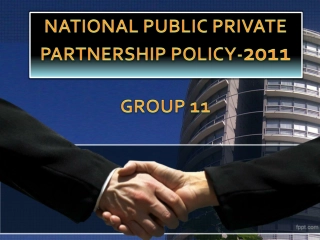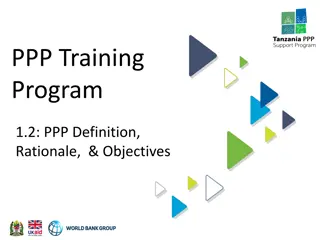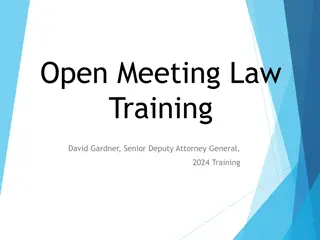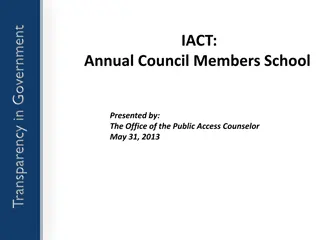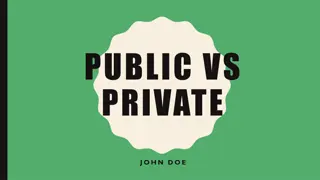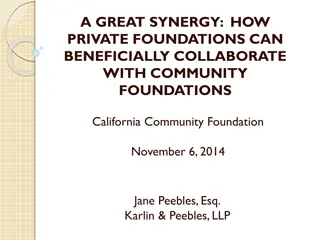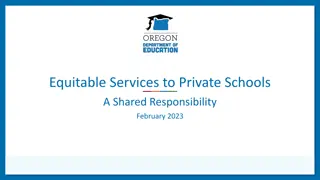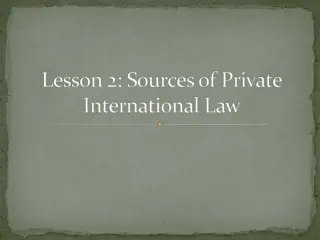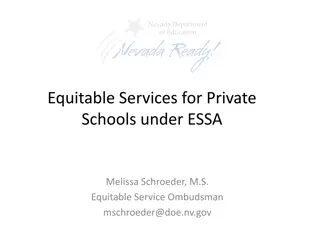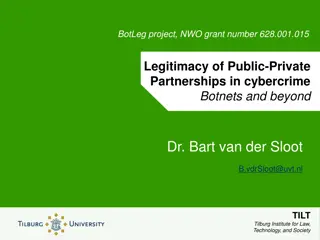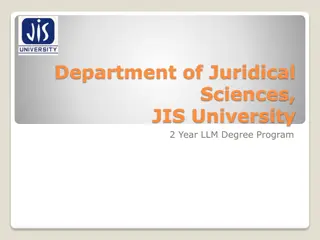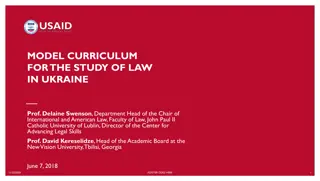National Public Private Partnership Policy 2011
An arrangement between the government and private sector for the creation of public assets or delivery of public services. This partnership focuses on harnessing private sector efficiencies, innovation, and technological improvements to provide affordable and improved services. Investments are made
5 views • 25 slides
Contrasting Public Finance and Private Finance
Public finance involves the income and expenditure of governmental bodies, focusing on societal welfare, compulsory nature, coercive revenue collection, and long-term welfare objectives. In contrast, private finance pertains to individual financial operations, voluntary nature, income adjustments to
9 views • 42 slides
Promoting Private Sector Engagement in Local Governance through PPPs in Zambia
This presentation outlines the promotion of private sector engagement in local governance in Zambia through Public-Private Partnerships (PPPs). It covers the legal and institutional frameworks, processes, sub-national level PPP projects, current initiatives, lessons learned, and conclusions. The ove
2 views • 23 slides
Private Security Training: Law, Regulations, and Civil Liability
Covering a range of essential topics, this training presentation delves into private security regulations, civil law torts, limited authority of private citizens, citizens' arrests, and the role of private security professionals as agents of law enforcement. Understanding these concepts is crucial f
3 views • 36 slides
Everything You Need to Know About Hiring a Private Chef
\"Everything You Need to Know About Hiring a Private Chef\" offers comprehensive insights into the private chef hire process. Discover how to find the perfect chef for your culinary needs, what to expect in terms of services and costs, and tips for ensuring a memorable dining experience. Elevate you
0 views • 9 slides
Introduction to Public Key Cryptography
Public key cryptography, exemplified by algorithms like Diffie-Hellman and RSA, revolutionizes secure communication by allowing users to encrypt messages with public keys known to all and decrypt them with private keys known only to the intended recipient. This advanced encryption method ensures sec
1 views • 44 slides
Understanding Different Types of Companies in Business
Explore the various kinds of companies in the business world, including statutory companies, registered companies, private companies, public companies, and more. Learn about the differences between private and public companies, statutory company examples like LIC and RBI, and the characteristics of
0 views • 25 slides
Understanding Public and Private Sectors in the Economy
The public sector, private sector, and joint sector play crucial roles in the economy. Public sector includes government services and enterprises, while private sector focuses on profit-making activities. Private sector contributes significantly to national income, generates employment, and ensures
0 views • 20 slides
Overview of Business Organization in the Private Sector
Explore the types of business organizations in the private sector, including sole traders, partnerships, private limited companies, public limited companies, franchises, and joint ventures. Learn about the distinctions between public and private sector organizations, reasons for choosing different b
0 views • 22 slides
Understanding Gas Laws: Boyle's, Charles', Gay-Lussac's, and Avogadro's Laws
Gas laws such as Boyle's Law, Charles' Law, Gay-Lussac's Law, and Avogadro's Law govern the behavior of gases under different conditions. Boyle's Law relates pressure and volume at constant temperature, Charles' Law relates volume and temperature at constant pressure, Gay-Lussac's Law relates pressu
1 views • 19 slides
Understanding Public-Private Partnerships (PPPs)
Public-Private Partnerships (PPPs) involve collaborations between public and private entities to deliver infrastructure and services. This training program delves into the definition, rationale, and objectives of PPPs, highlighting the various components, characteristics, and key considerations invo
2 views • 35 slides
Private Security Training PowerPoint Supplement Overview
Explore a comprehensive PowerPoint supplement covering private security regulations, civil law, citizen's arrest, and more. Discover critical topics like current trends, active threats, and the limited authority of private security professionals. Learn about legal issues, reporting requirements, and
5 views • 35 slides
Enhancing E-Waste Recycling Through Public-Private Partnerships
Public-Private Partnerships (PPPs) offer a promising approach for e-waste recycling, addressing challenges such as cost sustainability and knowledge gaps. This model leverages the strengths of both the public and private sectors, improving operational efficiency, access to new markets, and the integ
0 views • 11 slides
Private School Children with Disabilities - U.S. Department of Education Updates
U.S. Department of Education's Office of Special Education Programs has implemented new regulations and key changes regarding children with disabilities enrolled in private schools. The changes include responsibilities of local educational agencies, consent requirements, and clarification on due pro
2 views • 26 slides
The Case for Private Credit Investments in the Global Market
Private credit investments are gaining significance in the global market, offering innovative financing solutions outside traditional avenues like public markets. With a focus on innovation, independence, and integrity, private credit investments cater to diverse sectors such as real estate, natural
1 views • 9 slides
Private Placement of Securities: Overview and Methods to Raise Capital
Private placement of securities involves offering securities to a select group of investors by a company, excluding public offering. This presentation covers the meaning of private placement, provisions of law, methods to raise capital through private placement, and understanding the Private Placeme
3 views • 16 slides
Private Schools: CARES Act Equitable Services Overview
This session introduces and discusses the implications of the CARES Act Equitable Services for private schools, including a timeline of events, court decisions, and implications for districts and private schools. The presentation covers the requirement for LEAs to provide equitable services to non-p
2 views • 12 slides
Understanding Nevada's Open Meeting Law
Nevada's Open Meeting Law mandates that public bodies conduct meetings openly to aid in the people's business. The law requires meetings to be public, transparent, and accessible, whether in person or via remote technology systems. It also defines what constitutes a public body and outlines the appl
0 views • 16 slides
Contrasting Legal Systems Around the World
Explore the diverse legal families globally, such as Civil Law (Romano-Germanic) and Common Law (Anglo-American), along with their historical backgrounds, sources of law, and dominant ideologies. Delve into the distinctions between Civil Law and Common Law, their origins, development, and practical
0 views • 17 slides
Understanding Private Nuisance in Torts Law
Private nuisance involves interference with a person's use and enjoyment of their land, categorized into three types. To prove a private nuisance, one must show harm caused by encroachment, physical injury, or interference with quiet enjoyment. Not all annoyances qualify as private nuisances. Remedi
0 views • 53 slides
Understanding Indiana's Open Door Law: Public Access and Governance
The Indiana Open Door Law ensures transparency in public agency actions by requiring open meetings unless exempted. The Public Access Counselor provides guidance on public access laws, emphasizing the importance of public information accessibility. Meetings under the law must be open to the public,
0 views • 17 slides
Geospatial Private Sector in Africa: Opportunities and Challenges
The geospatial private sector in Africa faces challenges due to its small and disjointed nature, with a focus mainly on multinational corporations. Initiatives like UN-GGIM are encouraging private sector participation at national and continental levels. Efforts are being made to include the private
0 views • 6 slides
Understanding Public Goods in Higher Education
This text delves into the concept of public goods in higher education, examining the distinctions between public and private forms, the economic and political dimensions, and the normative value of public goods. It discusses the economic definition of public goods, emphasizing their non-rivalrous an
1 views • 18 slides
Overview of UK Law: Statute Law, Common Law, Criminal Law, Civil Law
Statute Law is written law created through the parliamentary process, forming the basis of the legal system. Common Law, on the other hand, is unwritten law based on judicial decisions and precedents. They govern different aspects such as civil and criminal matters, each with its unique characterist
0 views • 15 slides
Understanding Public and Private Spaces and Behaviors
Exploring the concept of public versus private spaces, behaviors, and activities through examples such as public places like restaurants and schools, as well as private places like bedrooms and medical offices. The content also delves into public behaviors like shaking hands and talking to people, c
0 views • 7 slides
Understanding Florida's Sunshine Law and Open Meetings
Florida's Sunshine Law encompasses the Open Meetings Law and the Public Records Law, ensuring transparency in government proceedings. The Open Meetings Law requires meetings of elected boards to be open to the public, with strict requirements for notice, notes, and public access. Discussions between
0 views • 20 slides
Private Foundations: Advantages, Benefits, and Collaborations
Explore the benefits of private foundations, including control over grant-making, donor recognition, tax advantages, and collaboration possibilities with community foundations. Understand the differences between private foundations and donor-advised funds, the formation of private family foundations
0 views • 72 slides
Enhancing Public-Private Dialogue for Development in Africa
Addressing the shortcomings in public-private dialogue can lead to improved business environments in Africa. The challenges include information gaps, lack of involvement of the private sector in decision-making, and issues with economic regulation. Successful examples like the Cameroon Business Foru
0 views • 5 slides
Equitable Services to Private Schools: Shared Responsibility and Requirements
Equitable services to private schools involve federal programs supported by tax dollars, allowing all children and teachers access to various educational programs. Private schools must be not-for-profit to qualify. Consultation plays a crucial role in reaching agreements on providing equitable and e
0 views • 17 slides
Understanding Private International Law: Key Principles and Treaty Regimes
This lesson delves into the sources, key principles, and treaty regimes of private international law. It covers jurisdictional competence, conflicts of law, recognition of foreign judgments, Canadian common law vs. Quebec civil law, Hague Conventions, and the United Nations Convention on Contracts f
1 views • 14 slides
Understanding Equitable Services for Private Schools under ESSA
Equitable Services for Private Schools under ESSA ensures fair educational benefits for private school children, teachers, and personnel compared to public schools. Requirements cover various programs like Title I and Title IV, with an ombudsman role to enforce compliance. ESSA mandates separate pro
0 views • 29 slides
Understanding Private Equity Fundamentals for Long-Term Value Creation
Private equity presents a compelling alternative to public equity, emphasizing active ownership and long-term value creation. This involves investing in non-traded equity stakes in private companies with the goal of enhancing performance and attaining profitability upon exit. Formal and informal pri
0 views • 18 slides
Classification of Law: Understanding Different Types and Functions
Exploring the classification of law is essential for understanding the diverse nature of legal systems. This overview delves into domestic law vs. public international law, public law vs. private law, and the sub-divisions within public law, such as constitutional, administrative, and criminal law.
0 views • 19 slides
Exploring Legitimacy and Public-Private Partnerships in Cybercrime Enforcement
Investigate the legitimacy of public-private partnerships in addressing cybercrime, focusing on botnets and related issues. The study examines the classic model of legitimacy involving the state, citizens, and the market, and explores different stakeholders' roles in ensuring legitimacy in enforceme
0 views • 14 slides
Overview of Legal Systems and Roman Law Development
Legal systems play a crucial role in governing societies, with Roman Law, Common Law, Civil Law, and Religious Law being some of the major types worldwide. Roman Law, focusing on private law, has influenced legal traditions in various regions, especially in Europe. Contrasting Common Law and Civil L
0 views • 26 slides
Insights from Public Police Executives on Private Security Services
This survey conducted by the FSU Policing, Security Technology and Private Security Research & Policy Institute gathered opinions from 68 public police executives on private security services. The executives shared anticipation of future expansions, factors influencing growth, types of private secur
0 views • 9 slides
Inefficiency of Risk Pricing in Public-Private Partnerships
This discussion focuses on the inefficiency of risk pricing in Public-Private Partnerships (PPPs) and the implications for taxpayers. The analysis covers why PPP risk pricing is a critical topic, the costs of transferring risks to private parties, when risk pricing is considered efficient, and the r
0 views • 17 slides
2-Year LLM Degree Program in Juridical Sciences at JIS University
Explore the 2-year LLM degree program offered by the Department of Juridical Sciences at JIS University, specializing in Corporate Law, Criminal Law, and Constitutional Law. The program covers a range of specializations such as Comparative Criminal Law, Human Rights, Corporate Law, Competition Law,
0 views • 7 slides
Model Curriculum for the Study of Law in Ukraine
This model curriculum outlines the structure and requirements for studying law in Ukraine. It covers mandatory and recommended courses in private law, public law, and criminal law, as well as assumptions underlying the curriculum. With a focus on theory/practice balance, electives/specializations, a
0 views • 14 slides
The Role of Public Goods in Higher Education
This paper discusses the concept of public goods in higher education, exploring how they are defined, observed, and improved. It analyzes the distinctions between public and private goods based on economic and juridical-political factors, and examines the significance of public goods in advancing so
0 views • 19 slides
